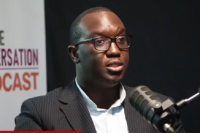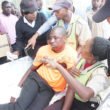Health Professionals Council of Zambia (HPCZ) registrar Dr Aaron Mujajati has appealed to health practitioners across the country to always remember that they are still bound by the professional code of conduct.
Dr Mujajati said the coming of the Internet must not affect medical ethics in any way, and that the Council would not accept the type of behaviour that exposed the vulnerability of patients in health facilities.
Commenting of the rampant distribution of pictures of patients on social media by health workers, Dr Mujajati said, when he featured on Hot FM’s Frank on Hot show, Tuesday, that it was unfair to circulate pictures of a patient who had not given consent to the distribution.
He lamented that people were usually vulnerable when they visited the hospital, and that they need to always be assured of professionalism by practitioners.
“I was born at the border of the advent of the Internet. The advent of social media, I have lived both sides of life. Where there no was Internet, now there is Internet. And because now, we are in this information age and information moves very fast, some practitioners forget that these are just tools. Facebook is a tool for communication; it does not influence or change the practice of medicine. That’s why we constantly remind our practitioners that medical ethics have not changed because of social media; medical ethics have not changed because we live in the information age, no! You are still required to uphold those standards. It’s unfortunate, particularly with social media that people find it [okay] taking pictures of patients and put them on social media indiscriminately. That’s unacceptable and I would like to appeal to and remind practitioners out there that you are still bound by the professional code of conduct, you are still bound by those medical ethics, and as a Council, we will not accept that type of behaviour,” Dr Mujajati cautioned.
“People come to the hospital and they are very vulnerable. You know, when you go to the hospital, you are extremely vulnerable and you are at the mercy of this practitioner and you need to be assured that this practitioner will be very professional with you. You don’t want a woman go to the hospital and then you find they are sexually molested, that’s unacceptable! We want to make sure that when people go to these facilities, they are confident, they feel safe. Of course, human error happens, but people should have that confidence that when we go into these facilities, we will feel safe. And the Health Professionals Council in terms of its professional code of conduct, it’s very clear. For those who are in doubt, it’s even on our website and it’s easily accessible.”
Dr Mujajati, however, said health practitioners were allowed to take pictures of patients where consent was given.
But he insisted that health facilities must always employ licenced health professionals.
“A practitioner is allowed to take a picture of a patient’s medical condition, provided that practitioner can demonstrate or prove that they got a written consent from the patient. Even where written consent is given, the rules require that you hide all the identifiers of the patient. So, if it’s the face, you blur it; if it’s the names, you remove them. But the patient must also be made aware of what you are going to do with that material. Now, where there is no consent, it’s a problem and consent, it’s not just someone signing a piece of paper, it requires that the practitioner has fully explained to the patient and the patient fully understands and has made an informed decision. So, the issue of taking pictures is not new, practitioners have always taken pictures. They are important for training, consultation. But sometimes that privilege can be abused and that’s why management in these facilities need to keep a keen eye and continue constantly reminding the practitioners. That’s why we insist that institutions must employ practitioners who are licensed because their behaviour is regulated,” said Dr Mujajati.












